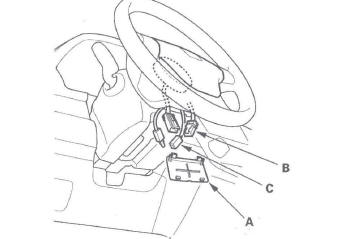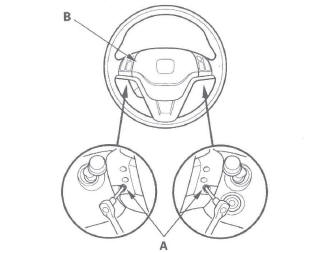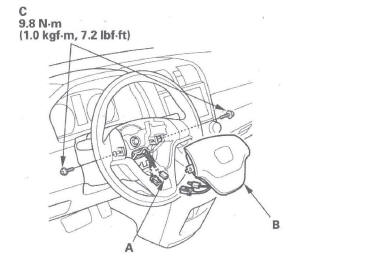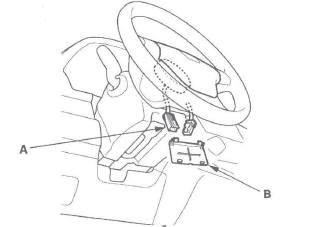Honda CR-V: Driver's Airbag Replacement
Removal
1. Disconnect the negative cable from the battery and
wait at least 3 minutes before beginning work.
2. Remove the access panel (A) from the steering
wheel, then disconnect the driver's airbag 4P
connector (B) and horn switch 1P connector (C)
from the cable reel.

3. Using a TORX T30 bit, remove the two TORX bolts
(A).

4. Remove the driver's airbag (B).
Installation
1. Connect the horn switch connector (1P) (A) to the
driver's airbag (B).

2. Place the driver's airbag in the steering wheel, and
secure it with new TORX bolts (C).
3. Connect the cable reel 4P connector (A) to the
driver's airbag 4P connector, then install the access
panel (B) on the steering wheel.

4. Connect the negative cable from the battery.
5. After installing the airbag, confirm proper system
operation:
- Turn the ignition switch ON (II); the SRS indicator should come on for
about 6 seconds and then go off.
- Make sure the horn works.
READ NEXT:
Removal
1. Disconnect the negative cable from the battery, and
wait at least 3 minutes before beginning work.
2. Remove the passenger's vent panel.
3. Remove the dashboard center upper panel.
4. Re
NOTE: Review the seat replacement procedure before doing repairs or service.
Removal
1. Disconnect the negative cable from the battery, and
wait at least 3 minutes before beginning work.
2. Disconnec
Special Tools Required
Deployment tool 07HAZ-SG00500
Before scrapping any airbags, side airbags, side curtain
airbags, seat belt tensioners; or lap belt tensioner
(including those in a whole vehicle t
SEE MORE:
NOTE: Before you troubleshoot, record all freeze data and any on-board
snapshot, and review General Troubleshooting Information.
1. Warm up the engine to normal operating
temperature (the radiator fan comes on).
2. Make sure that the transmission is filled to the
proper level, and check for fluid
NOTE: Do not damage or drop the combination switch as the steering angle
sensor is sensitive to shock and vibration.
1. Remove the steering wheel.
2. Remove the steering column covers and the cable reel.
3. Remove the combination switch assembly.
4. Remove the combination light switch (A) and t
© 2016-2025 Copyright www.hcrv.net






